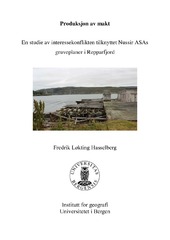Produksjon av makt. En studie av interessekonflikten tilknyttet Nussir ASAs gruveplaner i Repparfjord
Master thesis
Permanent lenke
https://hdl.handle.net/1956/13031Utgivelsesdato
2016-09-01Metadata
Vis full innførselSamlinger
- Department of Geography [634]
Sammendrag
As the Norwegian oil age is coming to an end, industry and government are in need for alternative sources of profit and value creation. At the same time, attention is increasingly turned towards the north as Norwegian authorities wishes to manifest its apparent key position in the Arctic. In relation to this, the government has proclaimed the north as its most important foreign policy field and now seeks to exploit the vast potential represented by the region's abundant natural resources. This thesis is based on the conflicting interests and perception of place between actors wanting to make a profit of the above mentioned natural resources on the one side, and the already present but not-conforming indigenous and environmental interests on the other. In particular, the thesis aims to analyse the on going controversy and related power struggle concerning Nussir ASA's planned extraction of copper ore in the hills above Repparfjorden in the sparsely populated municipality of Kvalsund. The analysis revolves around a research question seeking to understand why the current battle for power seems to end in favour of the extraction interests. Using concepts linked to an ontological take on the reality as consisting of assemblages in addition to a relational understanding of power as a produced capacity, the thesis explains the heated power struggle by referring to the way different actors act upon and respond to the inherent contingencies of the situation by mobilizing both material and discursive resources. Denne oppgaven er basert på den pågående interessekonflikten tilknyttet gruveplanene i Repparfjord. Analysen sentreres rundt et spørsmål rettet mot å presentere et svar på hvorfor det er utvinningsinteressene som virker å gå seirende ut av interessekonflikten, hvor oppgaven konkluderer med at dette skyldes gruveforkjempernes suksess med å fremme prosjektet som lokalt forankret.
